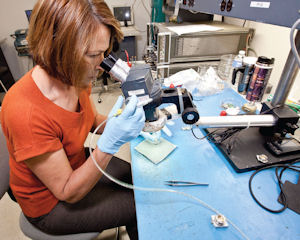Electronic Sensor Technology wants to make it easier for users of medical marijuana to know what they are inhaling. The Newbury Park manufacturer of chemical detectors has made custom-designed equipment for use by the California Testing Authority, a Newport Beach-based start-up marketing itself to medical marijuana growers and dispensaries as the best provider of the same safeguards and controls other medicines receive. Testing is not mandatory by the state of California or the counties in which the marijuana is grown or sold — an example of how, when it comes to regulations, cannabis used for health reasons remains in a gray area. A City of Los Angeles ordinance on medical marijuana has a testing requirement, but there are questions about how strictly it’s enforced. Still, there is a groundswell in testing and a motivation in the medical marijuana industry to advance testing techniques, said Kris Hermes, spokesman for Americans for Safe Access, a national organization advocating on behalf of medical marijuana growers, dispensers and users. “This is not because there is pressure,” Hermes said. “The community itself has a desire to advance knowledge and protect the health of patients.” Electronic Sensor Technology and the California Testing Authority are early entrants into medical marijuana testing. The mobility of the EST detector gives an advantage over labs that have opened in the state, said Bill Wittmeyer, chief operating officer at Electronic Sensor. “It runs the test and you have an answer right there on the premise,” Wittmeyer said. “You may be at a clinic with 100 strains (of marijuana) and can test them all in a half a day.” Electronic Sensor has identified homeland security and health care applications as the two big growth areas for the company. In addition to the medical marijuana testing, researchers are using EST detectors to detect certain types of cancers and diabetes, and the devise is approved for use on heart and lung transplant patients and children with cystic fibrosis, Wittmeyer said. “We have created a technology that is part of the overall solution to the market,” Wittmeyer said. Testing Benefits The purpose for testing is two-fold — to make sure there are no dangerous levels of pesticides, herbicides or other chemicals harmful to medical marijuana patients with weak immune systems; and to determine the potency of the cannabis. Compounds found in the plant such as THC, CBD, (Cannabidiol) and CBN (Cannabinol) have been found to have therapeutic value. More research is needed to fully know the medicinal uses of marijuana, and testing to determine the potency of compounds like THC and CBD plays into that, said Pouya Moghavem, founder of California Testing Authority. “(Marijuana) is a pharmacologically active plant with beneficial features for certain people that we do not completely understand,” Moghavem said. The gas chromatography method — in which a gas moves the sample being tested through a metal or glass column and breaks it down into component compounds — is among the most reliable to determine cannabis potency, according to a study by California NORML and Dutch scientist Dr. Arno Hazekamp. The EST device uses that method. California NORML and Hazekamp assessed 10 labs in two states for the study and concluded the precision and proficiency of a majority of cannabis testing labs compared favorably to other analytical testing industries. The results were published in the Autumn 2011 issue of O’Shaughnessy’s: The Journal Of Cannabis In Clinical Practice. Testing services only have become available in the past couple of years, but they have already proven to offer a competitive advantage, said California Normal State Coordinator Dale Gieringer. “If it is available, you would prefer to have tested, versus non-tested, cannabis,” said Gieringer, who co-authored the O’Shaughnessy’s article. (Gieringer was not familiar with California Testing Authority or Electronic Sensor Technology.) In addition to California, testing labs have opened in Colorado. California Testing Authority also operates a sister company in Michigan. Modifying the detector for use on medical marijuana was a collaborative effort between Electronic Sensor executives and staff and Moghavem. They collaborated on the modifications starting in early 2010. In August 2011, Electronic Sensor agreed to be the exclusive equipment manufacturer for Moghavem’s company. That effort involved making changes to software and components of the detector and overcoming challenges working with certain chemicals found in marijuana that affect getting an accurate result. Electronic Sensor manufactures and assembles its detectors in Newbury Park, and California Testing Authority markets the device to the medical marijuana community. CTA uses a handful of the detectors in California, Michigan and soon in Colorado. Those detectors are a small percentage of the 60 to 100 detectors that Electric Sensor makes in a year. Still, Wittmeyer expects that as marijuana laws become more liberal and more states allow the plant for medicinal uses, more EST detectors will be used for testing. Since California Testing Authority is still a start-up, Moghavem would not disclose revenues. Its mobility with the EST detectors gives the company an advantage over brick-and-mortar labs, Moghavem said. “There is nobody that can compete with us and test as many samples in an hour and for so many things,” Moghavem said.
